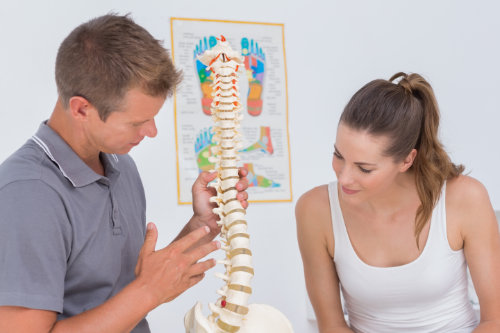Back pain can be debilitating. A patient can find they have trouble moving or engaging in regular activities like lifting their children or even walking. Pain in the mid to upper back can be caused by a variety of issues, and it can have a significant impact on a person’s quality of life. Many people see chiropractors to get relief from their back pain, but there are some things that chiropractic patients should know so that they can get the most out of their treatments.
What is the Thoracic Spine?
There are 12 vertebrae that make up the thoracic spine which is located just above the lumbar spine and just below the cervical spine. It is often referred to as the upper back. This part of the spine has several very important functions. The ribs connect with this portion of the spine and it also is responsible for protecting the spinal cord.
The thoracic spine also differs from the lumbar spine and cervical spine. Instead of curving inward (lordosis) as those areas do, it curves outward (kyphosis). This provide the freedom of movement that allows a person to bend forward and touch their toes. It does not allow for much bending backwards; that typically comes from the lower back.
There are many nerves that extend from the thoracic spine. They control organ function for the major organs, including:
T1 to T4
- Heart
- Esophagus
- Upper body muscles
- Lungs
- Larynx
- Part of the arms
- Trachea
- Esophagus
T5 to T10
- Gallbladder
- Diaphragm
- Small intestine
- Appendix
- Liver
- Kidneys
- Suprarenal gland
- Stomach
- Spleen
- Adrenal gland
- Pancreas
T11 to T12
- Small intestines
- Mid to upper body muscles
- Lymph circulation
- Colon
- Solar plexus
- Uterus
Mid to Upper Back Pain
Pain in the thoracic area of the spine is often caused by muscle strain, overuse, and injury to the discs, ligaments, and muscles that surround the spine and support it. A few truck accident attorneys said that accidents cases have also had similar issues. Poor posture can also cause pain in that area. It is also very common for myofascial pain to affect the connective tissue of` muscle groups and individual muscles These problems can occur due to a variety of causes:
- Slouching or slumping while standing or sitting
- Getting in a car accident where the patient is lurched forward or jolted
- Lifting something that is too heavy
- Yard work
- Getting struck or hit in the back
- Playing sports
Osteoarthritis can also occur in this area. It is caused by torn cartilage brought about by the everyday wear and teas and even the simple process of aging. Fractured vertebrae can also cause back pain in the thoracic area, as can a herniated disc, and a spine that is oddly shaped or misshapen. Degenerative disc disease and spinal stenosis can also be culprits.
Chiropractic Care for the Thoracic Spine
The goal of the chiropractor treating a patient for thoracic back pain will usually focus on reducing the pain and inflammation in the area. The treatments may include:
- Spinal adjustments
- Specialized exercise recommendations
- Ergonomic training
- Distraction
- Heat or ice
- Traction
- Electrical stimulation
The chiropractor may also recommend nutritional supplements like proteolytic enzymes to aid in managing the swelling and pain that may be caused by disc herniation and some other back injuries. They may also recommend dietary changes or weight loss to help the patient manage their pain.
Chiropractic is a safe, effective, non-invasive treatment for mid to upper back pain. Many patients experience results immediately which is another draw for people. Most patients with back problems will be advised to maintain regular chiropractic visits in order to effective manage the pain and keep it at bay.

Leave a Reply